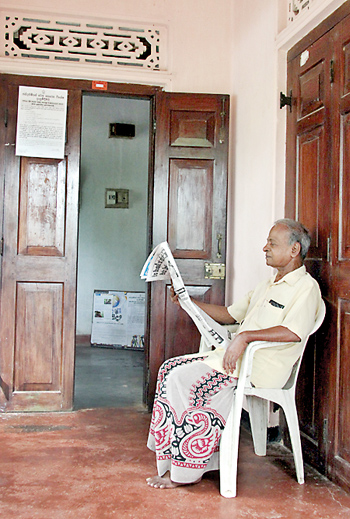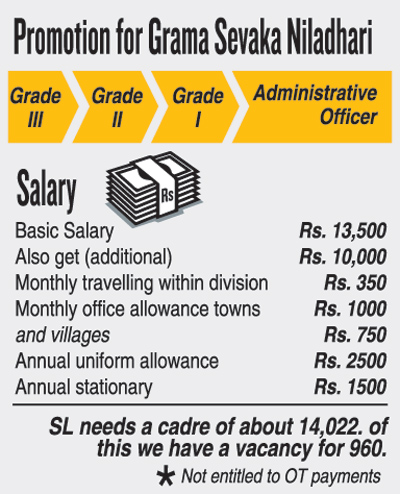News
Grama Niladhari service crying for upgrade
They are made to work under trying conditions, often inside tiny cubicles in the corner of a temple building or a state building or even inside a makeshift hut with drooping cobwebs, no fans, no file cabinets to keep important documents and, in some cases, no toilet.

A Grama Niladhari’s house in Kesbewa used as his office too. Pic by Indika Handuwala
Grama Niladharis across the country have one problem in common — they lack basic facilities.
The Grama Niladhari or the village officer is a public official who works six days a week and in unspecified working hours.
Operating at the grassroots level, they are an important link in the decentralised decision making process.
It is with their approval that an issue pertaining to a village is sent to the Divisional Secretariat and then to the District Secretariat before it is taken up at either provincial or national level.
Besides, they are the only state officials who hold both civil and police powers.
Their official duties include issuing character and residency certificates, endorsing identity card applications, giving letters of recommendation for electricity and water connections, preparing reports identifying the needs and problems of the areas, and acting as peace officers in settling disputes.
They also keep records of new businesses, issue permits for alcohol sales and work closely with health programmes such as the dengue eradication campaign.
“Our work involves everything from cradle to grave. We register births and deaths and everything in-between. But sadly most of us are unable to perform our duties to the complete satisfaction of the people, largely because of lack of facilities,” said Sri Lanka United Grama Niladhari Association (SLUGNA) President W. M. P. B. Wanninayake.
Grama Niladharis maintain important documents that require safe keeping, but most of them do not have basic facilities such as file cabinets and lockers.
Mr. Wanninayake, a Grama Niladhari since 1982, said a Grama Niladhari’s job involved working closely with the people to provide them a quality administrative service and the job was not confined to administrative affairs alone. In villages, people approach Grama Niladharis to seek solutions to their personal problems.
“It is our duty to listen and help them find a solution. But there is little privacy in many Grama Niladhari offices situated in a corner of a temple building or a state building where others can overhear their conversations.
Also most Grama Niladhari offices do not have a proper sitting area or enough chairs for the people who sometimes have to wait for long hours till their work is done,” Mr. Wanninayake said.
Grama Niladharis in town areas are given Rs. 1000 a month and village areas Rs. 750 to pay the rent for their office premises. They are also given a travel allowance of Rs. 350 a month.
But most Grama Niladharis find these payments hardly adequate and spend from their salary to meet any shortcomings.
SLUGNA Deputy Secretary Daya Bandara Rathnayake has been a Grama Niladhari for more than 23 years.
Now serving in a GN division in the Badulla district, he said often most Grama Niladharis would spend from their salary to meet urgent official expenses.
He said that in addition to financial issues, Grama Niladharis serving in villages with a small population and operating from their houses had to face interference from friends and relatives and as a result they found it difficult to act independently.
“If we set up offices at our houses, friends and relatives try to get their work done without proper documents. When we refuse, they start to have a grudge against us,” he said. But problems of Grama Niladharis of city areas are of a different kind.
A Colombo District Grama Niladhari who did not want to be named said his division had nearly 25,000 people and more than 40 people would call over at his office for various jobs.
“It is not always easy to work with a large number of people. Sometimes forged documents are produced. So we need to check the documents for their authenticity before certifying them and this process takes time,” he said.
The official said that Grama Niladharis were required to visit the residences of the people to ensure that they were in fact living there, but the monthly travel allowance of Rs. 350 was hardly enough to cover even one-day’s travel expense.
The problem became more acute when a Grama Niladhari was asked to cover a neighbouring division also until the vacancy was filled, he said.
There are 960 vacancies in the 14,022-strong Grama Niladhari cadre. The Kandy district has 82 vacancies, the Kurunegala district 79, the Batticaloa district 72, the Gampaha district 51 and the Colombo district 43.
The Home Affairs Ministry says it will fill these vacancies by next year.
Those who want to be a Grama Niladhari should have passed the G.C.E Advanced Level Examination and passed the Ordinary Level with credit passes for Sinhala and mathematics.
They should be between 21 and 30 and residents of the division where the vacancy exists. Selected candidates are given a three-month training.
They will start their career as Grama Niladhari Grade III with a basic salary of Rs. 13,500. They can end up as Administrative Officer after going through promotions to Grade II and I.
“This takes a lot of work. It is a stressful job and we meet people backed by political influences to get their work done.
We have to deal with all kinds of people and sometimes, we even lose our patience, though we know as public officers we have to be polite,” said a female Grama Niladhari who also did not want to be named.
She said female Grama Niladharis had to face more hardships because some people would not listen to a woman’s advice.
However, Home Affairs Ministry Secretary J. J. Rathnasiri said a Grama Niladhari should know to build his personality in keeping with the nature of the job and be polite to people.
“A Grama Niladhari is a civil officer. We have asked them to locate their offices in places such as community halls or temples,” he said adding that most Grama Niladharis served in areas with a small population and therefore it was not hard for a single person to handle this.
To carry out their official work, most Grama Niladharis had been given motorcycles following the initial payment of Rs. 50,000, the Ministry Secretary said.
He said the ministry in collaboration with other state institutions would conduct programmes to educate Grama Niladharis on how to do their work effectively and efficiently.
| Grama Niladharis should maintain a database Maintaining a regularly updated database with information regarding persons within a Grama Niladhari division will help reduce the crime rate and take quick decisions when needed, said Dharmasena Dissanayake, a former Secretary to the Public Administration and Home Affairs. He said that if a Grama Niladhari maintained such a data base and update it regularly, decision makers could act effectively to solve many issues in the country. “By maintaining the data base, Grama Niladharis can keep a track of unemployment, school dropouts and population growth. Grama Niladharis, Agriculture Officials, Samurdhi Officials and midwives should work together in one office complex so that they do not have to waste time travelling from place to place,” he said. |
SLUGNA President Wanninayake said that to make the service efficient, every Grama Niladhari should be given a laptop so that he can maintain a record of the residents in his or her division.
He said the Government should also provide boots, raincoats and flashlights to Grama Niladharis.
“When a disaster takes place the first person to go to the scene is a Grama Niladhari, but we do not have necessary gear to do our job effectively. People need better working conditions to be motivated to work better.”

